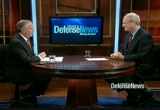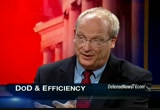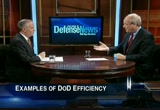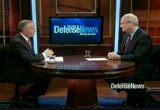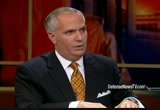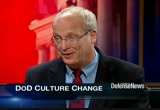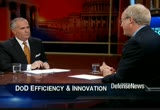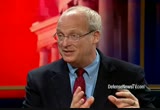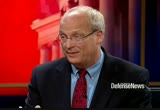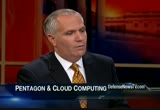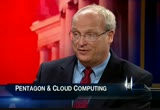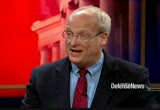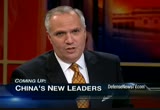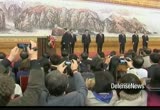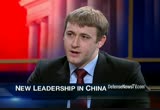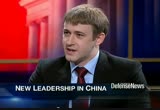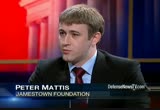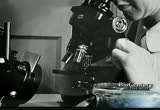tv This Week in Defense CBS November 18, 2012 8:00am-8:30am EST
8:00 am
>> welcome to "this week in defense news" i'm vago muradian. the chinese communist party has selected a new leader. we'll hear from an expert about what such a major change in beijing means for the relationship with america and across asia. but first, since office, the obama administration has made reforming how -- a top priority, and so far, experts say, those efforts have helped save billions of dollars a year. still, in unveiling the budget plans earlier this year can the pentagon said that it would have to save a whopping $60 billion from efficiencies, if it's to afford the key priorities in an era of declining resources what has the pentagon done so far? and how do you ring efficiency from an organize as diverse and far flunk as the defendant
8:01 am
department? joining us is david wennergren, the department's assistant deputy chief management officer. sir, welcome to the program. >> thank you. >> so your office was created co help drive the efficiencies across the department. and the goal is to save $60 billion overall. how do you do that? is it by making minor changes to just about everything, for example, legacy programs? is it through sweeping major reforms? is it eliminating work? what is the strategic approach you guys are taking to save money? >> it takes a little bit of all those things. it's a big organization, 3.5 million people spread around the world. the i.t. budget alone is 38 billion, we spend 7 billion on the department. one interesting thing about being a changed leader in the office is that there are so many business lines, and so big, and so you have the large functioning organizations, financial management, human resources, you have the large organizations, military departments, defense agencying.
8:02 am
in getting them to think they could focus on different outcomes, and actually help achieve different outcomes and how do you use technology, how do you use your people best, it's a full-time job, and it spans the gambit. we have initiatives from fuel efficiency, travel, how you do your people processes differently, and we in the dc mode team spent a lot of time thinking about the business i.t. that under lays all that is correct and how could you -- all that, and how could you come up with better outcomes. >> let's go to, what would you say is sort of one of the most concrete things that has had the most cross-cutting impact that you guys have instituted that's really going to make major change? >> you know, one of the things we're excited about is we've created a strategic management plan for the department of defense, so for the first time in its history, in the business side, we have strong articulated goals that are about outcomes you want to achieve.
8:03 am
articulated by the business leader. well understood and articulationed and able to be acted on. the strategic management planning covers all the major areas of business, if you will. financial management, people, energy, how you buy things, how we buy things better, deliver i.t. information technology in a more equipped cent way, re -- expedient way. so having a plan in place, and now having actually worked through over the last three, we looked at the entire $7 billion of p i.t. spending it was the first time in the history of d d -- dod we did this, to entry in the funk al leaders and describe their strategy. this is what i need you to get done. thieves are the outcomes i need you to achieve to get the better use of ople, and then, each military department has to come in and explain how they will
8:04 am
spend their dollars wisely. we were able to look at the $7 billion spent, identified 10% of the systems of the department to be retired as no longer meeting those goals, and found ways to drive better efficiency. >> one of the thing we talked about was work, the fundamental idea, a friends of mine is a management expert, and one of the things he said you have to assess work, determine whether it has to be done or not before en you go into the processes or decide how many people you are going to need for n how important is it to really go through with the fine tooth comb the work folks are doing. you often find in public or private offerings that we become very enamored with the shiny object. the i.t. system, or the solution, and we don't think about, there's work that needs to get done, and outcome we want to achieve. if you don't think about that first, then heaven help you. lots of companies make great i.t. solutions but are designed around optimized business processes. if you don't fix the process
8:05 am
first, you will spend a lot of time and money trying to make i.t. systems work for you. it's product change first. >> and you could argue a lot of the procurement and some acquisition challenging are driven by the fact that maybe people aren't thinking as they should. the savings goals are very large. do you guys at this point have any idea how you're performing against that goal? are you, you know, on track to make the 60 billion, behind? where do you stand right now? and is there a total that you can give us, which so far we've saved x amount of money? >> probably not a good total. but you can see across all of the organization, how we're working to make the goals be met. and like i said, in our space, we're driving business process change, significantly reducing the costs is of the i.t. support, and how do we get things done, do training
8:06 am
differently, travel differently, do energy differently, how do we do supply change differently? >> what you guys are struggling with really is a fundamental cultural adjustment to go from sort of, you know, almost a cost base model to performance. how do you get folks, great people, but they know this is the way we've done business, and what you're telling them is you want them to do business differently. >> it's a hugely important topic. there was an article about how do you spot innovation, it was about looking through a different lens, we become enamored with the status quo, because we're good with it. but technology is changing so fast, that the opportunities to do things differently abound, but if you become hunkered down in the way you have in the past, you'll miss the opportunities. so it's about a cross culture, which in times that are flushed with money, then people aren't
8:07 am
8:08 am
8:09 am
innovation is regarded something that is technological. what are you talking about, and what is the kind of innovation you guys are looking for in order to help reform the department? >> tech lodge cat -- technological aspect, the pace is profound, and what you see in the world around you is stuff we have to bring to large organizations. but it is more than that. innovation is about the processes and the people, and frankly, they are the big exercise components. the process change part is all about people, and culture, and what are you used to, and how much you want to change. we would be foolish if we looked at bell curve of an organization and imagined the majority of people are in the tail that can't wait to change. the majority of people are change neutral, and mart of this is how -- part of this is how do you create outcomes to allow people to step out of the comfort zone and think about better ways of doing business. >> how do you i -- part of way
8:10 am
is, you keep some savings, while where we're going. so there's going to be more pressure, folks will lose some budget money, they'll lose some people. how do you sympathize people to elm brings that? >> part of this is this goal, this common shared outcome. what are we trying to do? so in the department of defense, there is the shared commitment to the deployed forces we have to make it better, because all of money you spend on overhead is money that can't be spent to defend the nation. there's a sheer purpose, but frankly, a lot of it is about shining a spotlight on things. if you're an optimist, you think about it as management by attention. nobody want to be the one that didn't get work done, but either way it works, if you can start to talk break what do you want to do, what's the outcome you want to achieve, what's a performance measure that allows to you track your progress, it
8:11 am
will do two things. it will see where you're not making progress, but you'll be encouraged by the progress you are making so you don't lose hope and lose momentum. >> let's go to the tracking question. one of the big challenges the department has had and got waivers from the congress is the audit ability of the records. it's huge amounts of money, how do you manage to do the efficiency piece of if you're not sure how many money ur spending? >> audit-ability is porch, so the teach is to get the clean financial statement, so i don't want to minimize that. that's important work, but i wouldn't want to use it as an excuse. there are a lot of things that can be done while on the path of audit-ability, and say in the area of human resources r logistics, supply chain, you know, i.t. spin, what are you trying to accomplish? and are you making progress to somewhere you said you were
8:12 am
going -- to where you said you were going to go? >> one of the things that the department has been very high on is the idea of cloud computing as beings able to some some of the security challenges and issues, and some say those are large risks and challenges. more broadly, it's like a tech lodge cattle pace thing, that the department, because of the way is it buys things is behind the technological 8-ball. what are the potential pit falls of cloud computing? how do you mitigate the risks, and how does the department just get better as fielding some systems? >> there was so much there! >> i'm going to give you like three minutes. >> it's a hugely important topic. if you look the way the world is done now, the young lieutenant can go home tonight and bring in a new solution, and it doesn't take people weeks to develop code to do things, the whole web
8:13 am
phenomenon allows things to mesh things up. the joke is, people in defense say, well, i'm happy to be in the cloud as long as none of the rest are you with me. and that speaks to the security concerns. one end, you have classified work, that has to be done in compartment al secure networks, so i don't want the human intelligence analysts using facebook to get their collaboration done, but tools like facebook help save lives when it comes down to disaster relief. if you can understand how to use the tools, and when is the right time to use a tool in a protected knelt work, and when do you use the global tools that are available, you can make a big difference. cloud computing if done right can help improve your security posture, but if you do it wrong, it doesn't, so it's helping yourselves walk through because frankly, we're in a great work force. we have 3 million people spread around the world. i need to get to the people and the information i need from any
8:14 am
device, anywhere in the world, and that doesn't happen unless you start being able to put data available to you from a remote location. so it's in the cloud, could be a private cloud, could be public cloud, depending on the type of information. >> how do you fundamentally start to acquire things at a pace at which technology is advancing? >> yeah. the big key is bite size pieces. you have to do things in a more modular way, and the technological change gives thaws opportunity. in the past, we stepped to do the big bang, we would go and do the big system, and it takes so long, and so many things go wrong, you get disconnected from the customer while you build out separate infrastructure. the future is modular, where it's nor more than 6 to 12 months from the moment of the inception of the idea until you have something in the hands of the customer that they can use and make sure it works and you build on. it's a changing business model for the industry partners, rather than the one big contract that for years, it's a bunch of small bites of the apple, but
8:15 am
it's happening all around us. we can see -- to make sure security is being taken care of. it could have been done as a class i.t. project, but instead, it was all about exposes data, and then overlaying it on something like google earth so i can get on any computer, any harbor in the world, and it was done in weeks for thousands of dollars instead of years and millions. >> david, thanks, very, very much for joining us. coming up, a look at china's new leadership. stay tuned.
8:18 am
the chinese communist party installed its new leaders last week with xi jinping succeeding hu jintao as the leader of the world's most populous nation. xi was tapped to succeed hu some five years ago as part of the orderly transition plan that's the hallmark of chinese politics. different in both experience and character, xi is the son of one of communist china's founding fathers and was an exchange student in iowa in the 1980s. with us today is peter mattis one of the brightest of a new generation of china analysts. now with the jamestown stown foundation where he's the editor of the "china brief." welcome to the program. >> thank you for having me vago. >> what do we know about xi that tells you how he's going to govern differently from hu? >> i think one of the most
8:19 am
important things about xi is that he is first and foremost, a nationalist. he's someone who believes in china. he's grown up in china that is reform and opening up. he entered government in the late 1970s right after jinping inaugurated the new set roll policies and he is really the cream of a set of officials that have come up through the entire period in china. as far as how he's different than hu jintao, i think people want to paint him as being a conservative in that hu jintao was a reformer but i'm not hour the record of the last sen years -- sure the record of the last ten years really points jintao and his people as necessarily being reformers and xi as necessarily being these conservative party hacks. >> also there's a sense that he recently when xi disappeared after making sort of comments that we have to look at more reform and greater modernization of the economy,
8:20 am
you know, officials sort of explained he had a back problem. but others say he was shoring up his base. should we look at that as a sign that he's actually perhaps more of a reformer than we might think? >> well, reform has always been a part of what the chinese talk about. even mao zedong talked about the reform. i don't think that should be a shock to the system or some big remark. i think part of the disappearance is that in a 24/7 news cycle secretive leadership is going to look like it's unnecessarily hiding away. if he really did have back surgery or back pain of course he was going to be away. one person i talked to said that the first part of that really was back pain and the second part of it basically pulling all day study sessions to get him more familiar with policy portfolios he's going to take over. >> he had a different form of back problem after making the
8:21 am
comments. in terms ow how he's likely to deal with the rest of the world of course tenses are running high -- tensions are running high both with taiwan as well as with japan. and also there are concerns in washington. how is this new leader going to be looking at the roast of the world and -- rest of the world and dealing with countries like the united states and the region? >> well -- i think like i said he qualifies as being somebody who's probably a nationalist and probably proud of what china's done in the last 30 years, china now is the world's second largest economy and taking a greater role across the world. so i think he's someone who maybe perhaps a little bit sensitive to what china's stature or is how people may perceive the slights to its -- to its interests. but i'm not sure that we should see a really dramatic change in the way china has behaved. >> is the -- and i can't
8:22 am
believe that it's 2012 and still talking about bureaus but obviously you know in a communist country that's an important organization. what is the composition of the bureau tell us about how he's going to lead or how much leash he's going to have to do what he wants? >> well, i think given that a lot of his people who are supposed to be allies of him have made it to the hop. it suggests he may have a little bit more freedom than hu jintao did with the standing committed that a very different set of alignments. jintao was the first among a set of equals but each one seemed to pursue policies within their own sort of system rather autonomously. with the smaller standing committee of seven members, and most of them linked to xi jinping he may have a little more freedom to push and pursue the policies he chooses.
8:23 am
>> should we be looking for any change in the military modernization agenda trying to -- pretty much that stays unmoved? >> i don't think we should see any real change to the modernization agenda. you know, modernization is a long process. it's been spelled out very clearly that by 2020 they're supposed to have made major progress in mechanization sort of the chinese revolution in military affairs if you will. and this is a process that should be complete by the mid century. and as far as anything in the immediate term, they're probably going to focus on resolving what are called the two incompatibles. one is that the pla's cape -b89s right now are incompatible with fighting and winning a war under modern conditions. and the second is that their capabilities are incompatible with fulfilling the new historic missions meaning safeguarding the ccp and safeguarding world peace and stability.
8:24 am
8:26 am
because u.s. systems are the best in the world in terms of capability and supportability. but that lead may be in jeopardy as u.s. systems become increasingly expensive and packed with such cutting edge technology that even washington's friends have trouble getting them without modification. the joint strike fighter and rising costs are worrying partner nations and potential new customers alike. u.s. systems are popular because they gave better capability for the price than competitors but more weapons are problem gnattic in an era of fiscal austerity and growing competition. to its credit the obama administration made exports a priority and said it wants future systems designed from the start to succeed on export markets. that's great news as america's defense exports help allies, friends and partners better defend themselves, forge security relationships that span decades and lowest costs for the pentagon while keeping factories humming and americans
8:27 am
employed. but without change especially better cost control, america will outadvance and outprice itself from international markets key to its economy and national security. thank you for joining us for "this week in defense news," i'm vago muradian, you can watch in program online at defensenewstv.com or e-mail me at vago@defensenewstv.com. and before we go i'd like to wish all the viewers a happy thanksgiving. i'll be back next week at the same time. until then have a great week. [ captions by: caption colorado, llc 800-775-7838 email: co alright everybody, get your heads up. now when i was in the military, i learned that if you stand together, you can stand up to anything! no matter where i was deployed, i always knew that somebody had my back! you boys are your own band of brothers! you have each other! just like i had navy federal credit union... 24/7... live customer support! let's go! let's go! 4 million members. 4 million stories.
8:29 am
the war against deadly bacteria are the bugs winning? i'm steve usdin, welcome to "biocentury this week". the introduction of antibiotics in the 1940s transformed medicine. extending and improving millions of lives, for the first time in history, common bacterial infections were no longer death sentences. they also made modern medicine possible invasive surgery, chemotherapy, transplantation, all must protect vulnerable patients from infections. but starting the day the first dose of penicillin was tested bacteria having evolves -- have been evolving launching a never ending war with drug developers and evolution. for decades a continuing treatment of new antibiotics kept humans well ahead of the bugs but
137 Views
IN COLLECTIONS
WUSA (CBS) Television Archive
Television Archive  Television Archive News Search Service
Television Archive News Search Service 
Uploaded by TV Archive on

 Live Music Archive
Live Music Archive Librivox Free Audio
Librivox Free Audio Metropolitan Museum
Metropolitan Museum Cleveland Museum of Art
Cleveland Museum of Art Internet Arcade
Internet Arcade Console Living Room
Console Living Room Books to Borrow
Books to Borrow Open Library
Open Library TV News
TV News Understanding 9/11
Understanding 9/11
